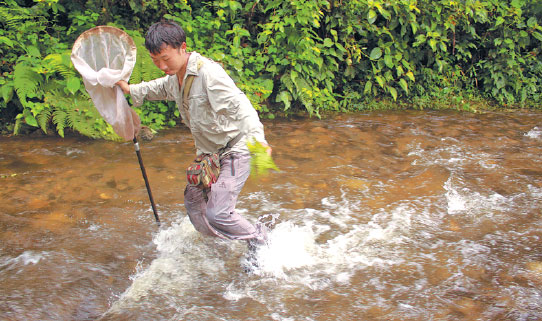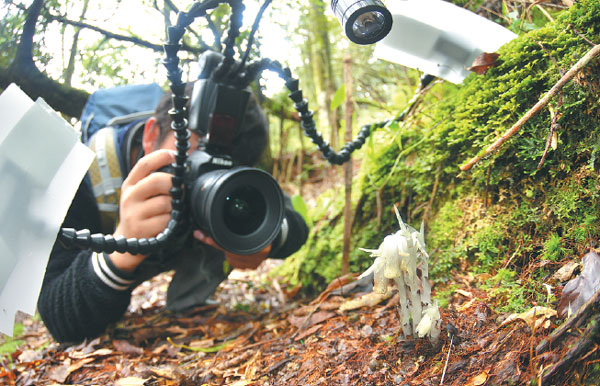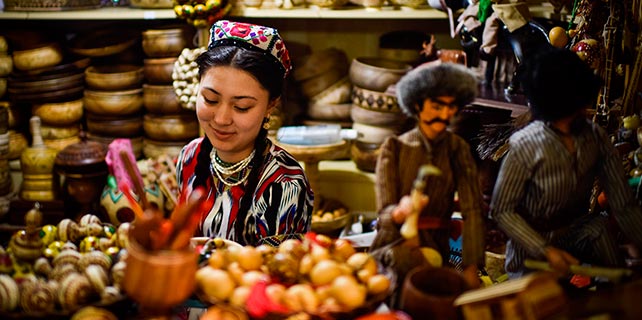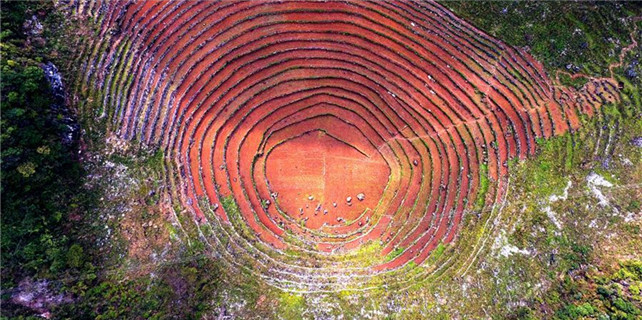It all started with bugs
Eager to learn and share knowledge about natural history, a Chinese has become a social media star, Zhang Xingjian reports.
Zhang Chenliang's interest in natural history has earned him a big following in Chinese social media, with his answers to thousands of questions on everything from entomology and zoology to botany and geography.
Widely known as the "man of natural history", or Bowu Jun in Chinese, Zhang now boasts 6 million followers on Sina Weibo.
His fans know that the "walking encyclopedia" is picky about the questions he answers, ignoring those he considers frivolous.
|
Zhang Chenliang focuses his camera to take a photo of a Monotropa uniflora plant. Photos Provided to China Daily |

Born in Beijing, the 29-year-old has fostered a deep love of nature since he was a child.
"I was fond of insects. I do not remember how many insects I brought up," Zhang recalls.

"As long as I've seen them, I've had a curiosity to know more about these creatures. The magic of nature is beyond description.
"In my childhood, a fish tank and glass bottles were all transformed into my ecological zone to bring up different kinds of insects. To me, it was fantastic to see them grow."
This fondness for insects determined his later path in life.
In 2011, he pursued a master's degree in agricultural entomology and pest control at China Agricultural University in Beijing.
During the study period, Zhang worked as an intern at Chinese magazine Natural History.
He also helped operate the magazine's account on Sina Weibo.
At the beginning, Zhang just stuck to usual knowledge-oriented content.
Though sometimes his humorous language appealed to some netizens, the outcome wasn't good enough.
Zhang later tried a unique way: inviting netizens to ask questions.
As tricky as a question might be, Zhang always gave a satisfactory answer.
His reputation rose as the number of his followers grew online.
Zhang's overnight sensation also stirred up doubts about him.
Some suggested Zhang's success was due to a whole team's support.
"I operate the official Weibo account myself. And, I answer all the questions alone," says Zhang.
"I tried to find others to share some of the burden but I am still alone at the current stage. I hope some successors will show up one day."
Zhang is considering releasing several video programs or doing a live broadcast to better introduce his knowledge to others.
"Videos can help promote knowledge in a more direct way," Zhang says.
"For instance, as spring comes, many people cannot distinguish the differences between peach flowers and cherry blossoms. Through videos, I can teach people how to spot the difference."
During his work, Zhang needs to identify different species from not only photos but also drawings.
He has gradually developed his own drawing skills, inspiring him to publish his first book last year.
In Hai Cuo Tuo Biji (Notes on an Illustrated Handbook of Marine Animals), published by China Citic Press in November, Zhang identifies and analyzes 30 such creatures.
Zhang's book is an interpretation of an illustrated book of the same title by Qing Dynasty (1644-1911) painter and naturalist Nie Huang.
"As an introductory book, Nie's work is rich in content and vivid in pictures," Zhang says.
"However, I have noticed that there were many mistakes in the book due to the limitations of the era."
To ensure accuracy, Zhang traveled to China's eastern coastal areas, and even Japan and Thailand.
"The research and investigation process was an unforgettable experience, as I could travel and study at the same time," Zhang recalls.
His book became one of the best-sellers in the country, selling 110,000 copies over the past few months.
"Two books from two masters on natural history. When I read them, I feel like two walking encyclopedias on natural history are having a conversation," a reader comments online.
Yang Lina, a primary school teacher in Beijing, says Zhang is quite popular among her students.
"They talk about him after class and may turn to him when they encounter some questions on nature and science," Yang says.
"Zhang is more than an online celebrity. To some degree, he is an instructor that inspires children to learn about the fantastic world."
In the past decades, China has tried to popularize public science education through exhibitions, documentaries, online courses and do-it-yourself activities, with mixed results.
However, thanks to the rise of new media, science fans find it easier to communicate with each other and find they are not alone.
Given the soaring numbers of social media followers, best-selling books with science themes and even heated discussions about Zhang's posts, many believe the spring of natural history has arrived in China.
Zhang is hesitant to be that enthusiastic.
"Getting to know nature among Chinese still waits to be improved at the current stage," Zhang says.
"Therefore, there is still an uphill battle to fight before the spring really comes."
Contact the writer at zhangxingjian@chinadaily.com.cn
(China Daily USA 04/26/2017 page10)

















